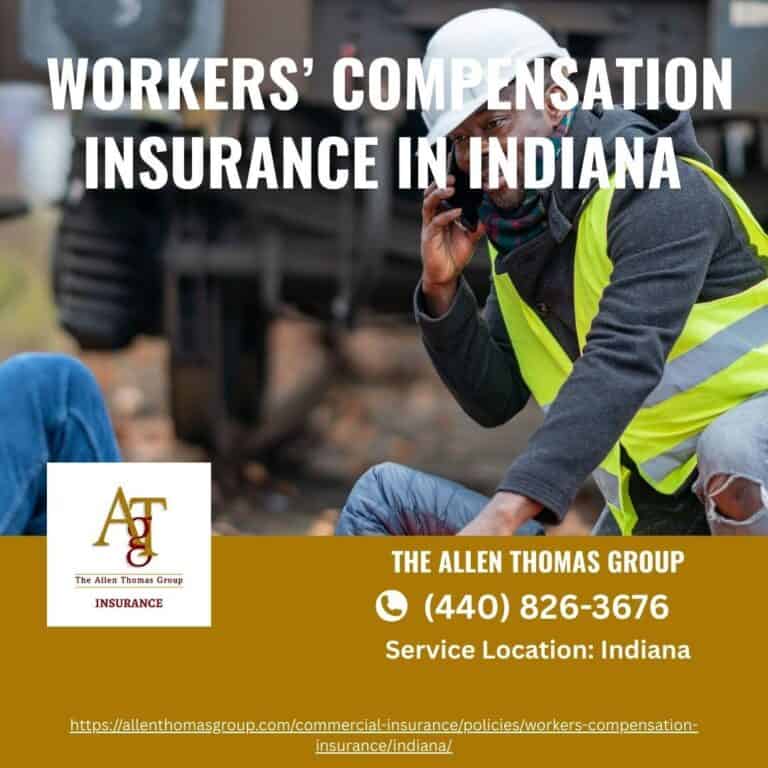Workers Compensation Insurance in Indiana: Comprehensive Coverage Guide
Are you an Indiana employer looking for reliable workers’ compensation insurance?
The Allen Thomas Group provides expert guidance and tailored coverage to protect your business and employees.
With over 20 years of experience, we help Indiana businesses navigate state-specific requirements while securing optimal protection at competitive rates.
Get a Quote Today!









Is Workers’ Compensation Insurance Required in Indiana?
Yes, Indiana law mandates that all employers with one or more employees must carry workers’ compensation insurance, regardless of whether employees work full-time or part-time. The only exceptions apply to sole proprietors, partners in partnerships, LLC members (who may exclude themselves but must cover employees), independent contractors meeting IRS guidelines, casual laborers, domestic workers, agricultural workers, and railroad employees.
So Many Companies Provide You With Many Quotes, But How Do You Know It Will Work For Your Business And Allow You To Scale and Why Are The Rates So Much Different?
We Get It And We Help Solve That For You.
Get A Precise Quote Now!
Understanding Workers Compensation Insurance in Indiana

Workers compensation insurance in Indiana serves as a mandatory program designed to provide financial assistance to employees who suffer work-related injuries or illnesses.
This coverage protects both your workforce and your business by covering medical expenses, lost wages, and rehabilitation costs while shielding employers from potential lawsuits related to workplace injuries.
Indiana operates under specific statutory regulations that every business owner must understand to maintain compliance and avoid costly penalties.
The state-regulated system creates a balance between employer responsibilities and employee rights through a structured benefits framework.
For Indiana businesses, proper workers compensation coverage isn’t just a legal obligation—it’s a critical risk management tool that safeguards your company’s financial stability and reputation.
Table Of Contents
Coverage Requirements for Indiana Businesses
Mandatory Coverage Thresholds
Indiana law mandates that all employers with one or more employees must carry workers compensation insurance, regardless of whether they work full-time or part-time.
This requirement applies across all industries and company sizes operating within state borders.
Unlike some states with minimum employee thresholds, Indiana requires coverage from the moment you hire your first employee. This strict requirement underscores the state’s commitment to protecting all workers, even in the smallest businesses.
Employers can obtain workers’ compensation insurance through private insurance carriers or opt for self-insurance if they meet specific financial requirements set by the Workers’ Compensation Board. Self-insured employers are responsible for providing benefits directly to their employees in case of work-related injuries or illnesses.
Employers must remember that failure to provide workers’ compensation insurance when required by law can lead to severe consequences. They may face penalties, legal actions from injured employees, and potential damage to their reputations.
Think of workers’ compensation insurance as a safety net protecting employees and employers. Just as a safety net catches and supports acrobats during daring circus acts, this insurance coverage safeguards workers. It provides peace of mind for employers, knowing that they have fulfilled their legal obligations.
By understanding the coverage requirements imposed by Indiana law, employers can ensure compliance and create a safe working environment that prioritizes the well-being of their employees.
Indiana-Specific Exemptions
While coverage is mandatory for most employers, Indiana does provide certain exemptions:
- Sole proprietors, partners in partnerships, and LLC members may elect to exclude themselves from coverage (though they must still provide it for any employees)
- Independent contractors who meet IRS guidelines
- Casual laborers
- Domestic workers
- Agricultural workers
- Railroad employees covered under federal programs
Understanding these exemptions can help you structure your coverage properly and avoid paying for unnecessary protection, but misclassifying workers can lead to serious compliance issues.
Protecting Remote and Temporary Workers
With modern work arrangements evolving, Indiana employers must understand their obligations regarding remote workers, temporary staff, and contractors. Your workers compensation policy must address all eligible employees regardless of work location or schedule.
Frequently Asked Questions
How is Workers' Compensation Calculated in Indiana?
Workers’ compensation premiums in Indiana are calculated based on your business’s industry classification code, total employee payroll, claims history, and experience modification rate. Insurers multiply your payroll (per $100) by your classification code rate, then adjust this figure using your experience modifier, which rewards businesses with fewer claims and penalizes those with more frequent injuries.
Who is Required to Join the Workers' Compensation Rating Bureau of Indiana?
All insurance carriers providing workers’ compensation coverage in Indiana must participate in the Workers’ Compensation Rating Bureau of Indiana. Self-insured employers who have received approval from the Indiana Workers’ Compensation Board to cover their own workers’ compensation liabilities are exempt from bureau membership but must still comply with all reporting requirements.
Complete Benefits Package Under Indiana Workers Comp

Indiana workers compensation insurance provides a comprehensive set of benefits to injured workers while protecting employers from potentially unlimited liability claims.
Medical Benefits Coverage
Workers comp policies pay for all necessary medical treatment related to workplace injuries or occupational illnesses, including:
- Emergency care
- Hospital stays
- Surgical procedures
- Prescription medications
- Physical therapy
- Medical equipment
- Follow-up appointments
These medical benefits continue until the employee reaches maximum medical improvement, with no deductibles or copays required from the injured worker.
Wage Replacement Provisions
When injuries prevent employees from working, Indiana workers compensation provides partial wage replacement:
- Temporary total disability benefits equal to 66⅔% of the worker’s average weekly wage
- Temporary partial disability benefits for employees who can work in limited capacity
- Permanent partial impairment benefits based on a schedule of injuries
- Permanent total disability benefits for workers unable to return to any employment
These wage benefits help maintain financial stability for your employees while they recover, reducing stress and potentially speeding recovery times.
Rehabilitation Services
Workers compensation in Indiana also covers vocational rehabilitation services when injuries prevent employees from returning to their previous positions. These programs help workers develop new skills or modify existing ones to reenter the workforce.
Death Benefits for Workplace Fatalities
In tragic cases where workplace accidents result in fatalities, workers compensation provides:
- Burial and funeral expense reimbursement
- Survivor benefits for dependents
- Ongoing financial support for eligible family members
These benefits protect families from financial hardship while giving employers a defined framework for addressing workplace tragedies.
Navigating the Indiana Claims Process
Injury Reporting Timelines
Employees must report injuries promptly, and employers have clear responsibilities:
- Workers should notify employers of injuries as soon as possible
- Employers must report all injuries requiring medical treatment beyond first aid
- Failure to report claims promptly can result in complications with coverage
Establishing clear reporting procedures helps ensure smooth claims processing and compliance with state requirements.
Employer's First Report of Injury Filing
Indiana employers must file an Employer’s First Report of Injury with their insurance carrier promptly after learning of a workplace injury or illness. Your insurance provider then submits this information to the Indiana Workers’ Compensation Board.
Medical Treatment Authorization
Employers must authorize necessary medical treatment quickly following workplace injuries. In Indiana, employers have the right to direct medical care initially, selecting approved healthcare providers for treatment.
Return-to-Work Programs
Implementing effective return-to-work programs benefits both employees and employers by:
- Providing modified duty options during recovery
- Reducing total claim costs
- Maintaining workforce productivity
- Improving employee morale and retention
The Allen Thomas Group helps Indiana businesses develop structured return-to-work programs that comply with state regulations while supporting business operations.
Managing Your Workers' Compensation Policy
Strategic policy management helps control costs while maintaining comprehensive protection for your Indiana business.
Premium Determination Factors
Workers compensation premiums in Indiana depend on several key factors:
- Industry risk classification codes
- Total employee payroll
- Claims history and experience modification rate
- Workplace safety programs and initiatives
Understanding these factors helps you anticipate costs and identify opportunities for premium reductions.
Experience Rating Impact
Your company’s safety record directly impacts premium costs through an experience modification factor or “e-mod.” Businesses with fewer claims than industry averages earn credits that reduce premiums, while those with more frequent claims face debits that increase costs.
Cost Containment Strategies
Indiana employers can control workers compensation costs through several proven strategies:
- Implementing comprehensive safety programs
- Conducting regular safety training
- Developing prompt injury response protocols
- Working with insurance partners who understand your industry risks
The Allen Thomas Group specializes in helping Indiana businesses implement effective cost containment strategies tailored to their specific operations.
Policy Renewal Considerations
Annual policy renewals provide opportunities to review coverage, adjust classifications, and implement new risk management strategies. Proactive renewal planning helps ensure continuous coverage while optimizing protection.
Legal Protections and Compliance Requirements
Exclusive Remedy Doctrine
Under Indiana law, workers compensation serves as the “exclusive remedy” for workplace injuries, preventing employees from filing additional lawsuits against employers for covered incidents. This protection only applies to businesses maintaining proper coverage.
Workplace Notice Posting Rules
Indiana employers must prominently display state-approved workers compensation notices in the workplace, informing employees about coverage and injury reporting procedures. Failure to comply with posting requirements can result in a $50 penalty.
Penalties for Non-Compliance in Indiana
Indiana imposes severe penalties on employers who fail to maintain required workers compensation coverage:
- Fines up to $50 per day for operating without valid coverage
- Criminal charges—failure to insure is a misdemeanor punishable by up to one year in prison and a $5,000 fine
- Personal liability for medical costs and lost wages
- Loss of exclusive remedy protection, opening the door to employee lawsuits
These penalties make proper coverage essential for every Indiana business.
Self-Insurance Options for Qualified Employers
Large Indiana employers with strong financial resources can apply for self-insurance status through the Indiana Workers’ Compensation Board. This option requires meeting stringent financial requirements and obtaining state approval.
Risk Management for Indiana Employers
Effective risk management reduces claim frequency and severity while creating safer workplaces for Indiana employees.
Workplace Safety Programs
Comprehensive safety programs form the foundation of effective workers compensation risk management. These programs should include:
- Written safety policies and procedures
- Regular workplace inspections
- Hazard identification and correction
- Emergency response planning
- Accident investigation procedures
The Allen Thomas Group helps Indiana businesses develop and implement effective safety programs aligned with industry best practices.
Injury Prevention Strategies
Proactive injury prevention strategies target common workplace hazards before they cause injuries, reducing claim frequency and controlling premium costs.
OSHA Compliance Connection
While workers compensation is governed by state law, compliance with federal OSHA regulations plays an important role in workplace safety. Maintaining OSHA compliance supports workers compensation risk management efforts while avoiding federal penalties.
Employee Safety Training
Regular safety training empowers workers to identify and avoid workplace hazards while following established safety protocols. Effective training programs reduce injuries and demonstrate your commitment to employee wellbeing.
The Allen Thomas Group Advantage for Indiana Businesses
Tailored Workers Compensation Solutions
We recognize that each Indiana business faces unique risks and challenges. Our approach involves:
- Conducting thorough risk assessments
- Identifying industry-specific exposures
- Matching coverage options to operational needs
- Customizing policies for optimal protection
This tailored approach ensures your business receives precisely the protection it needs without unnecessary coverage or costs.
Industry-Specific Coverage Expertise
Different industries face distinct workers compensation risks. Our specialists understand the unique challenges facing:
- Construction companies
- Manufacturing operations
- Healthcare providers
- Professional services firms
- Retail businesses
- Hospitality operations
This specialized knowledge allows us to anticipate risks and recommend appropriate coverage solutions for your specific industry.
Multi-State Operations Support
For Indiana businesses with operations in multiple states, we provide coordinated coverage that addresses varying requirements across jurisdictions while maintaining centralized policy management.
Claims Management Assistance
When injuries occur, our team provides hands-on claims support, helping you navigate the process while ensuring workers receive appropriate care and benefits. This assistance helps control claim costs while promoting positive outcomes for all parties.

Getting Started with Workers Compensation Insurance
Securing proper workers compensation coverage in Indiana involves several key steps:
Policy Application Process
The application process typically requires:
- Business entity information
- Federal employer identification number
- Complete employee roster and payroll data
- Detailed job descriptions
- Previous insurance and claims history
Our agents guide you through each step, ensuring accurate information and proper classification.
Required Documentation
Preparing proper documentation streamlines the application process. Key documents include:
- Business registration information
- Payroll records
- Employee classification details
- Safety program documentation
- Previous policy information (for established businesses)
Coverage Verification
Once your policy is in place, we provide certificates of insurance and help you maintain proper documentation for regulatory compliance.
Consultation with Experienced Agents
The Allen Thomas Group offers no-obligation consultations to discuss your Indiana workers compensation needs. Our experienced agents take the time to understand your business, explain coverage options, and develop protection strategies tailored to your specific situation.
Don’t settle for one-size-fits-all workers compensation coverage.
Contact The Allen Thomas Group today at (440) 826-3676 to discover how our tailored approach to Indiana workers compensation insurance can protect your business and employees while controlling costs.
This information is provided for general educational purposes only and should not be construed as legal advice. For specific guidance regarding your workers’ compensation obligations, please consult with a qualified attorney.
Indiana Cities We Serve
Alexandria
Anderson
Angola
Auburn
Austin
Avon
Bargersville
Batesville
Bedford
Beech Grove
Berne
Bloomington
Bluffton
Boonville
Brazil
Bremen
Bright
Brownsburg
Carmel
Cedar Lake
Charlestown
Chesterton
Cicero
Clarksville
Clinton
Columbia City
Columbus
Connersville
Crawfordsville
Crown Point
Cumberland
Danville
Decatur
De Motte
Dunlap
Dyer
East Chicago
Edinburgh
Elkhart
Ellettsville
Elwood
Evansville
Fishers
Fortville
Fort Wayne
Frankfort
Franklin
Garrett
Gary
Gas City
Goshen
Granger
Greencastle
Greendale
Greenfield
Greensburg
Greenwood
Griffith
Hammond
Hartford City
Hidden Valley
Highland
Hobart
Huntertown
Huntingburg
Huntington
Indianapolis
Jasper
Jeffersonville
Kendallville
Kokomo
Lafayette
Lakes of the Four Seasons
Lake Station
La Porte
Lawrence
Lawrenceburg
Lebanon
Ligonier
Linton
Logansport
Lowell
Madison
Marion
Martinsville
McCordsville
Merrillville
Michigan City
Mishawaka
Mitchell
Monticello
Mooresville
Mount Vernon
Muncie
Munster
Nappanee
New Albany
New Castle
New Haven
New Whiteland
Noblesville
North Manchester
North Terre Haute
North Vernon
Notre Dame
Pendleton
Peru
Plainfield
Plymouth
Portage
Porter
Portland
Princeton
Rensselaer
Richmond
Rochester
Roselawn
Rushville
Salem
Schererville
Scottsburg
Sellersburg
Seymour
Shelbyville
Simonton Lake
South Bend
South Haven
Speedway
St. John
Sullivan
Tell City
Terre Haute
Tipton
Valparaiso
Vincennes
Wabash
Warsaw
Washington
Westfield
West Lafayette
Westville
Whiteland
Whitestown
Whiting
Winchester
Winfield
Winona Lake
Yorktown
Zionsville


